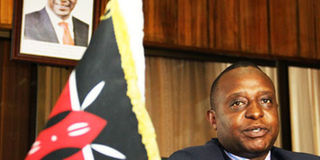Treasury plans to review excise and income tax laws

National Treasury Cabinet secretary Henry Rotich. The government has embarked on a plan to review the excise and income tax laws, just weeks after it did the same with the Value Added Tax Act 2013 that triggered a spike in food prices. FILE PHOTO
What you need to know:
- The review of the Incomes Tax Act and Customs and Excise Act is expected help the government earn more revenue to finance the various projects under the Vision 2030 economic growth plan.
- The government is under pressure to raise over Sh1.6 trillion to finance this year’s budgetary expenditure as the Jubilee government moves to implement its campaign promises and anchor the two-tier governance structure of the national and country governments.
The government has embarked on a plan to review the excise and income tax laws, just weeks after it did the same with the Value Added Tax Act 2013 that triggered a spike in food prices.
The review of the Incomes Tax Act and Customs and Excise Act is expected help the government earn more revenue to finance the various projects under the Vision 2030 economic growth plan.
ECONOMIC SUCCESS
“We are now embarking on reforming other taxes to ensure that they are in line with our Vision 2030 objectives. We are now prioritising excise tax and income tax and I want to ensure Kenyans that we are doing this in accordance with our Constitution,” said National Treasury Cabinet Secretary Henry Rotich.
Mr Rotich was speaking at a joint conference held yesterday by the government and the International Monetary Fund (IMF) to review economic successes the country has achieved since the implementation of the IMF’s Extended Credit Facility programme in Kenya in 2011.
An upward review of Excise Duty will see the price of imported electronics, beer, beverages, cigarettes, motor vehicles, fuel and telecommunications services, among others, go up.
On the other hand, any upward review of income tax could see both companies and individuals pay more to the Kenya Revenue Authority.
CAMPAIGN PROMISES
The government is under pressure to raise over Sh1.6 trillion to finance this year’s budgetary expenditure as the Jubilee government moves to implement its campaign promises and anchor the two-tier governance structure of the national and country governments.
Speaking at the same event, IMF director for Africa Antoinette Sayeh said that Kenya’s economic reforms have paid-off, making the country an example of the continent’s market-driven economic dynamism.
Ms Sayeh said Kenya’s economic achievements have not happened by chance, but reflect the country’s efforts to anchor economic stability in sound fiscal, monetary policies and market-oriented structural reforms.
“In fact, Kenya has stayed the course of economic reforms, with good results. Inflation has been tamed. Economic growth has maintained a good pace, despite the less-than-favourable global economic environment,” Ms Sayeh said.





